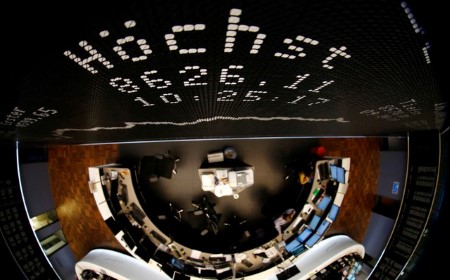




Inflation Update: Green light for easing
 DOWNLOAD
DOWNLOAD

December Economic Update: One for them, one for us
 DOWNLOAD
DOWNLOAD

Philippines Trade Update: Trade trajectories trend along
 DOWNLOAD
DOWNLOAD


Banks, oil stocks knock European shares to two-week lows

Europe’s STOXX 600 fell to two-week lows on Tuesday, pressured by losses in energy and bank stocks, as investors awaited a slew of major central bank decisions later in the week.
The pan-European STOXX 600 index ended 0.4% lower, its lowest closing level since Dec. 2.
The oil and gas index dropped 1.3% to its lowest level in 17 months as crude prices slid after economic data from China renewed demand concerns.
European banks were another drag, down 1.8% with Spanish lenders such as Santander and Sabadell at the forefront of losses. The broader Spanish benchmark dropped 1.6%.
While the US Federal Reserve is widely expected to deliver a 25-basis-point interest rate cut on Wednesday, the focus will be the pace of easing next year as the US economy appears to be on a steady footing. The Bank of Japan and the Bank of England’s rate announcements are due on Thursday.
“The (Fed’s) statement and press conference will be very important to watch; note that last meeting, the Fed removed forward guidance and turned data dependent,” said Naomi Fink, chief global strategist at Nikko Asset Management.
Weighing on global stocks, the 10-year US Treasury yield, the benchmark for global borrowing costs, touched its highest in more than three weeks. It was last at 4.3790%.
Britain’s FTSE 100 fell 0.8% as the pound climbed after data showed British pay rose by more than expected in the three months to October, prompting investors to further rein in bets on rate cuts next year.
Traders expect the BoE to stay on hold on Thursday.
Ranjiv Mann, senior fixed income portfolio manager at AllianzGI, expects the central bank to “signal its desire to resume rate cuts in early 2025 given emerging downside growth risks for the UK economy.”
Meanwhile, German business morale worsened more than expected in December, a survey from the Ifo Institute showed.
A separate survey released by the ZEW institute, however, showed investors were more optimistic, largely pinning their hopes on a change in government following the upcoming Feb. 23 election.
Sanofi gained 3.3% after the French drugmaker and Teva Pharmaceuticals said that their drug, duvakitug, met the main goals in a mid-stage trial when tested in patients with inflammatory bowel disease.
Britain’s Bunzl fell 5.7% after the business supplies distributor said stickier than anticipated deflation will have a slight impact on its annual profit, especially in its Continental Europe division.
(Reporting by Sruthi Shankar and Shashwat Chauhan in Bengaluru. Editing by Eileen Soreng and Mark Potter)
This article originally appeared on reuters.com





 By Reuters
By Reuters